2024届高考英语作文复习专项-2020年浙江卷polar bear读后续写(1) 课件-(共19张PPT)
文档属性
| 名称 | 2024届高考英语作文复习专项-2020年浙江卷polar bear读后续写(1) 课件-(共19张PPT) |
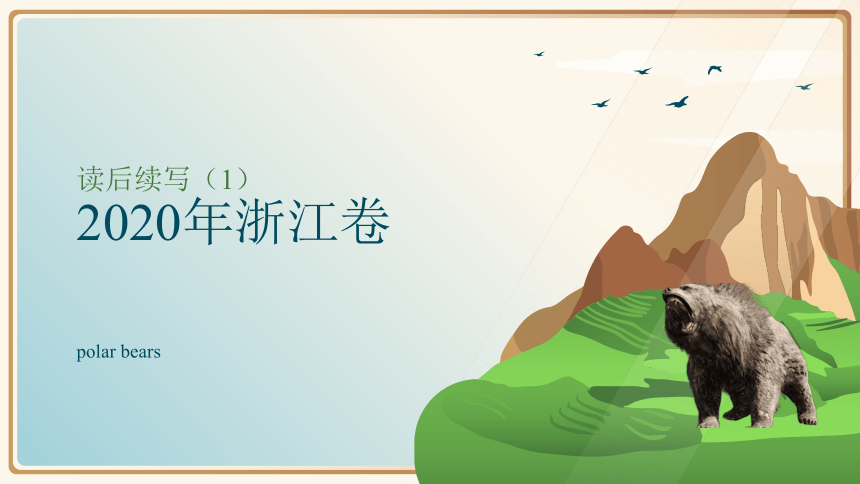
|
|
| 格式 | pptx | ||
| 文件大小 | 2.3MB | ||
| 资源类型 | 教案 | ||
| 版本资源 | 通用版 | ||
| 科目 | 英语 | ||
| 更新时间 | 2024-04-24 00:00:00 | ||
图片预览



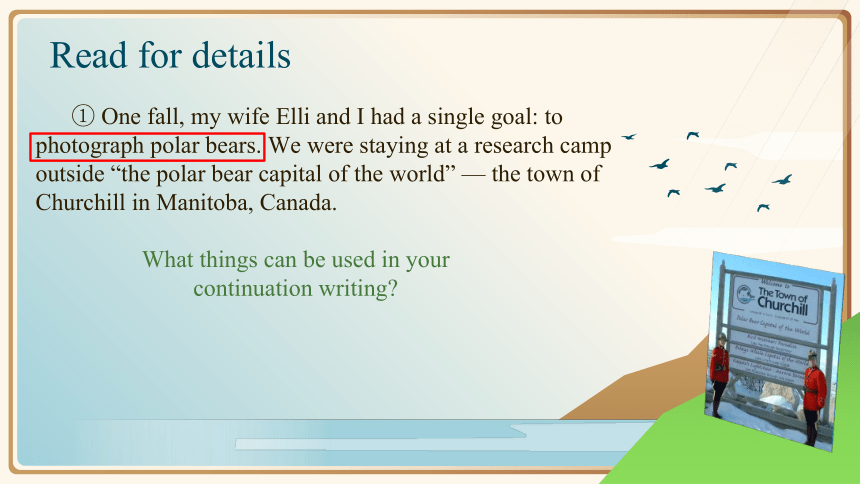
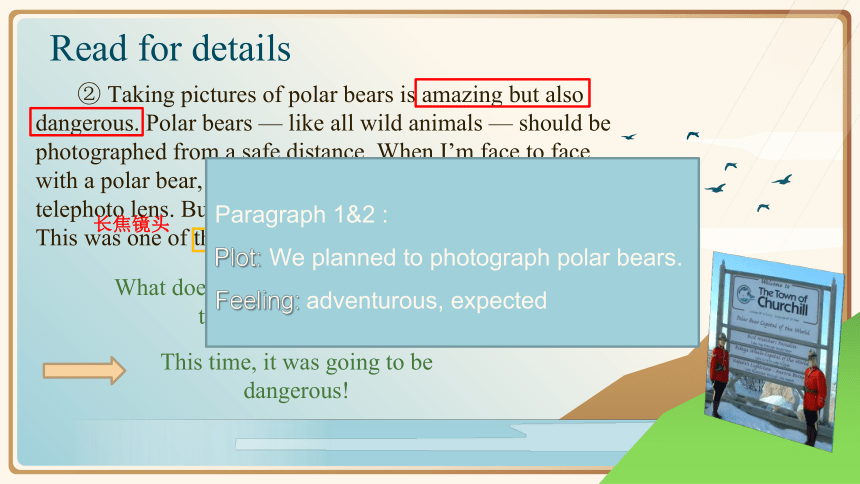
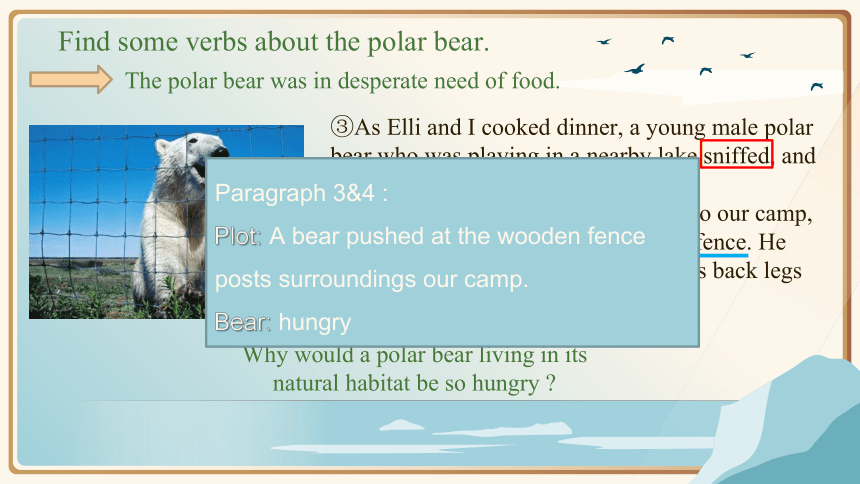
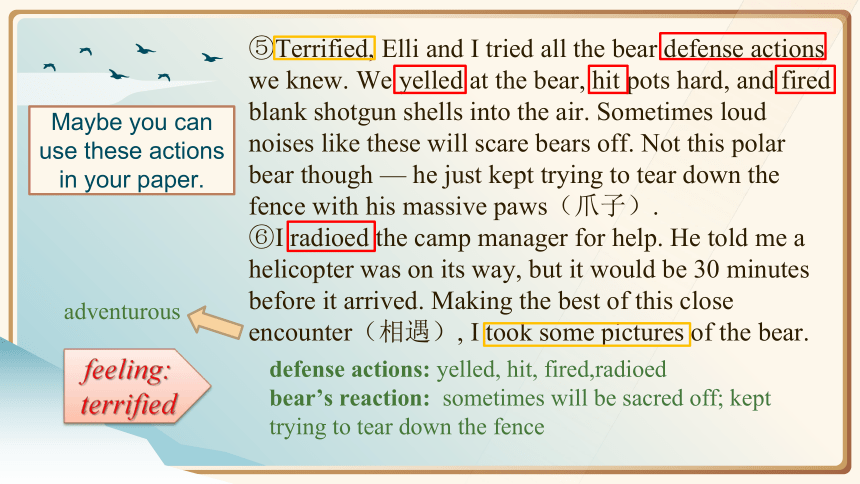
文档简介
(共19张PPT)
读后续写(1)
2020年浙江卷
polar bears
Paragraph 1
A few minutes later, the bear headed back to our camp…
Underline some key words.
Paragraph 2
At that very moment, the helicopter arrived…
What’s the problem
How was the problem sloved
the ending of paragraph 1
what did the bear do then...
we were saved. What did we do then
when
Read for the basic information
one fall
where
who
what
at a research camp
Eill and I; A young male polar bear
We planned to photograph polar bears.
When we cooked dinner, a bear came to our camp and tried to get in...
① One fall, my wife Elli and I had a single goal: to photograph polar bears. We were staying at a research camp outside “the polar bear capital of the world” — the town of Churchill in Manitoba, Canada.
Read for details
What things can be used in your continuation writing
② Taking pictures of polar bears is amazing but also dangerous. Polar bears — like all wild animals — should be photographed from a safe distance. When I’m face to face with a polar bear, I like it to be through a camera with a telephoto lens. But sometimes, that is easier said than done. This was one of those times.
Read for details
What does “that” “those times” refer to in this sentence
This time, it was going to be dangerous!
长焦镜头
feeling:
expected
Paragraph 1&2 :
Plot: We planned to photograph polar bears.
Feeling: adventurous, expected
③As Elli and I cooked dinner, a young male polar bear who was playing in a nearby lake sniffed, and smelled our garlic bread.
④The hungry bear followed his nose to our camp, which was surrounded by a high wire fence. He pulled and bit the wire. He stood on his back legs and pushed at the wooden fence posts.
Find some verbs about the polar bear.
Why would a polar bear living in its natural habitat be so hungry
The polar bear was in desperate need of food.
Paragraph 3&4 :
Plot: A bear pushed at the wooden fence posts surroundings our camp.
Bear: hungry
⑤Terrified, Elli and I tried all the bear defense actions we knew. We yelled at the bear, hit pots hard, and fired blank shotgun shells into the air. Sometimes loud noises like these will scare bears off. Not this polar bear though — he just kept trying to tear down the fence with his massive paws(爪子).
⑥I radioed the camp manager for help. He told me a helicopter was on its way, but it would be 30 minutes before it arrived. Making the best of this close encounter(相遇), I took some pictures of the bear.
defense actions: yelled, hit, fired,radioed
bear’s reaction: sometimes will be sacred off; kept trying to tear down the fence
adventurous
Maybe you can use these actions in your paper.
feeling:
terrified
⑦Elli and I feared the fence wouldn’t last through 30 more minutes of the bear’s punishment. The camp manager suggested I use pepper spray. The spray burns the bears’ eyes, but doesn’t hurt them. So I approached our uninvited guest slowly and, through the fence, sprayed him in the face. With an angry roar(吼叫), the bear ran to the lake to wash his eyes.
defense actions:
bear’s reaction:
use pepper spray, approached slowly, sprayed in the face
an angry roar, ran to wash his eyes
What else defense actions do you know
A few minutes later, the bear headed back to our camp…
1. What did the bear do after heading back
2. What object(物品) did we use to prevent the bear
3. What was the bear's reaction
At that very moment, the helicopter arrived…
feeling:
desperate
Paragraph 5-7 :
Plot: We tried to scare him off.
Feeling: terrified, desperate, brave
Bear: aggressive, angry, uncomfortable
Understand the theme
They both wanted to protect themselves, one from hungry, the other from the attack.
two adventurous fans of photography
a hungry and angry bear
Can the situation be solved peacefully
Why would a polar bear living in its natural habitat be so hungry
Why the author emphasize “blank shotgun shells”, “doesn’t hurt them”
1. climate change lead to food shortage
2. lose its way to its home
3. illness prevents it from hunting for food
4......
animals and humans can live harmoniously with each other
Pictures
Paragraph 1
A few minutes later, the bear headed back to our camp…
Design the main plots.
Paragraph 2
At that very moment, the helicopter arrived…
What’s the problem
How was the problem sloved
the ending of paragraph 1
what did the bear do then...
we were saved. What did we do then
1. What did the bear do after heading back
2. What object(物品) did we use to prevent the bear
3. What was the bear's reaction
1. What did we do then
2. What about the bear
3. How did we feel after we were saved
frustrated
fearful
feeling:
relief
Design plots
when where who Main plots
P1 Scene 1: ____________________________
Scene 2: _____________________________
P2 Scene1:
_____________________________
Theme: _____________________________
_____________________________
Bear’s action
Defense action and bear’s reaction
bear;
Eill and I
Eill and I;
bear
camp
camp
helicopter
home
Facing bear’s action
After they saw the helicopter;
when they saw those pictures
Animals and human can live harmoniously with each other.
Behaviors and feelings
动名词 Taking pictures of polar bears is amazing but also dangerous. (动名词作主语)
with 结构 With an angry roar, the bear ran to the lake to wash his eyes.
虚拟语气 The camp manager suggested I use pepper spray.
分词结构 ① Terrified, Elli and I tried all the bear defense actions we knew.(过去分词作状语)
② Making the best of this close encounter, I took some pictures of the bear. (现在分词短语作状语)
定语从句 ① As Elli and I cooked dinner, a young male polar bear who was playing in a nearby lake sniffed, and smelled our garlic bread.(限制性)
② The hungry bear followed his nose to our camp, which was surrounded by a high wire fence. (非限制性)
③ Terrified, Elli and I tried all the bear defense actions we knew. (省略关系词)
Language feature
Descriptions of bear
1. claw n. (动物或禽类的)爪,脚爪,脚趾 (用爪子或手指甲) v. 抓,撕,挠
eg: The bear ceased(抓住) at the wire fence, stood upright on his hind legs,(后腿站立) clawed and bit it ferociously(野蛮地).
2. growl vi./n. ~(at sb/sth) 低声吼叫
eg: The bear came our way, letting out a rumbling growl.
The bear growled and bared its sharp fangs. 那只熊吼叫着露出锋利的牙齿。
3. roar vi. 大声吼叫;咆哮
eg: All of a sudden, the bear stood upright and roared loudly with fury, beating its paws madly against the fence.
4. snarl vi.~(at sb/sth) to show the teeth and make a deep angry noise in the throat 龇牙低吼
eg: He agilely(灵活地) rose to his feet and snarled, baring his white fangs.
5.bang v. to hit sth in a way that makes a loud noise;砸
→ shove v. to push sb/sth in a rough way 猛推,乱挤,推撞
smash v. to move with a lot of force against sth solid; to make sth do this(使)猛烈撞击,猛烈碰撞
slam v. to put, push or throw sth into a particular place or position with a lot of force 用力一放;使劲一推;猛劲一摔
Vivid verbs
1.它(熊)的吼叫声(roar)在我们周围回响(echo)。
The bear’s roar echoed all around us.
2.他用后腿站立,推着木栅栏的柱子(post)。
It stood on his back legs and pushed at the wooden fence posts.
3.在仔细地观察了这片区域之后,熊向前小跑(trot)了几步。
After carefully observing the area, the bear trotted forward a few steps.
4.在我意识到她的意图之前,她把包扔过栅栏,落在远处的灌木丛里。
Before I realized her intentions, she tossed the bag across the fence, which landed in a bush far away.
5.我抓起相机,拍下了最后一张熊的照片。
I snatched my camera and snapped one last shot of the bear.
V-ing
1.我们紧紧地抱在一起,害怕地直打哆嗦(shiver)。
Shivering with fear,we huddled together.
2.听说我们没有受到任何身体伤害,飞行员让我们待在原地,捂住耳朵。
Hearing that we had not suffered any physical injury, the pilot told us to stay put and cover our ears.
3.听到直升飞机的声音,我们迅速跑回营地,用颤抖(trembling)的声音呼叫我们的救助者。
Hearing the helicopter, we ran back to the camp swiftly, and radioed our savior in a trembling voice.
4.看到北极熊逼近,我吓得呆住了,吓得不敢动。
Seeing the approaching of the polar bear, I froze with terror, too scared to move.
V-ed
1.被熊的吼叫声惊吓住,埃利和我尝试了我们所知道的所有应对熊的防卫措施。
Terrified by its roar, Elli and I tried all the bear defense actions we knew.
2.那只熊被喷雾激怒了,怒吼着迎接我们
Irritated by the spray, the bear greeted us with a howl of rage.
3.熊被面包的气味所吸引,向放面包的地方跑去。
Attracted by the smell of the bread, the bear run towards where the bread lay.
4.一种强烈的恐惧感抓住了我,我能感觉到手心冒汗。
Seized by a strong sense of horror, I could feel my palms sweating.
With 复合结构
1.熊跑远了,我叹了口气,如释重负。
With the bear running away , I signed with relief.
2.照了这张照片,我感到既轻松又幸运。
With the picture snapped, I felt both relieved and fortunate.
3.我一只手放在栏杆上,向那只熊喷射喷雾。
With one hand on the bars, I he fired the spray at the bear.
倒装句
1.我吓得喉咙发紧,双膝发软 (so that的倒装 )
So scared was I that my throat tightened and my knees felt weak.
2.我的心跳得如此之快以至于我几乎喘不过气来。(so that的倒装 )
So fast did my heart beat that I could hardly take a breath.
3.尽管我很害怕,但我还是鼓起勇气把喷雾器拔了出来(as 的倒转)
Scared as I was, I collected my bravery to pull out the spray.
4.无论我们怎么努力,我都无法摆脱那只熊。(as 的倒转)
Try as we might , I could not get rid of the bear.
Thank you
Looking forward to your passage!
读后续写(1)
2020年浙江卷
polar bears
Paragraph 1
A few minutes later, the bear headed back to our camp…
Underline some key words.
Paragraph 2
At that very moment, the helicopter arrived…
What’s the problem
How was the problem sloved
the ending of paragraph 1
what did the bear do then...
we were saved. What did we do then
when
Read for the basic information
one fall
where
who
what
at a research camp
Eill and I; A young male polar bear
We planned to photograph polar bears.
When we cooked dinner, a bear came to our camp and tried to get in...
① One fall, my wife Elli and I had a single goal: to photograph polar bears. We were staying at a research camp outside “the polar bear capital of the world” — the town of Churchill in Manitoba, Canada.
Read for details
What things can be used in your continuation writing
② Taking pictures of polar bears is amazing but also dangerous. Polar bears — like all wild animals — should be photographed from a safe distance. When I’m face to face with a polar bear, I like it to be through a camera with a telephoto lens. But sometimes, that is easier said than done. This was one of those times.
Read for details
What does “that” “those times” refer to in this sentence
This time, it was going to be dangerous!
长焦镜头
feeling:
expected
Paragraph 1&2 :
Plot: We planned to photograph polar bears.
Feeling: adventurous, expected
③As Elli and I cooked dinner, a young male polar bear who was playing in a nearby lake sniffed, and smelled our garlic bread.
④The hungry bear followed his nose to our camp, which was surrounded by a high wire fence. He pulled and bit the wire. He stood on his back legs and pushed at the wooden fence posts.
Find some verbs about the polar bear.
Why would a polar bear living in its natural habitat be so hungry
The polar bear was in desperate need of food.
Paragraph 3&4 :
Plot: A bear pushed at the wooden fence posts surroundings our camp.
Bear: hungry
⑤Terrified, Elli and I tried all the bear defense actions we knew. We yelled at the bear, hit pots hard, and fired blank shotgun shells into the air. Sometimes loud noises like these will scare bears off. Not this polar bear though — he just kept trying to tear down the fence with his massive paws(爪子).
⑥I radioed the camp manager for help. He told me a helicopter was on its way, but it would be 30 minutes before it arrived. Making the best of this close encounter(相遇), I took some pictures of the bear.
defense actions: yelled, hit, fired,radioed
bear’s reaction: sometimes will be sacred off; kept trying to tear down the fence
adventurous
Maybe you can use these actions in your paper.
feeling:
terrified
⑦Elli and I feared the fence wouldn’t last through 30 more minutes of the bear’s punishment. The camp manager suggested I use pepper spray. The spray burns the bears’ eyes, but doesn’t hurt them. So I approached our uninvited guest slowly and, through the fence, sprayed him in the face. With an angry roar(吼叫), the bear ran to the lake to wash his eyes.
defense actions:
bear’s reaction:
use pepper spray, approached slowly, sprayed in the face
an angry roar, ran to wash his eyes
What else defense actions do you know
A few minutes later, the bear headed back to our camp…
1. What did the bear do after heading back
2. What object(物品) did we use to prevent the bear
3. What was the bear's reaction
At that very moment, the helicopter arrived…
feeling:
desperate
Paragraph 5-7 :
Plot: We tried to scare him off.
Feeling: terrified, desperate, brave
Bear: aggressive, angry, uncomfortable
Understand the theme
They both wanted to protect themselves, one from hungry, the other from the attack.
two adventurous fans of photography
a hungry and angry bear
Can the situation be solved peacefully
Why would a polar bear living in its natural habitat be so hungry
Why the author emphasize “blank shotgun shells”, “doesn’t hurt them”
1. climate change lead to food shortage
2. lose its way to its home
3. illness prevents it from hunting for food
4......
animals and humans can live harmoniously with each other
Pictures
Paragraph 1
A few minutes later, the bear headed back to our camp…
Design the main plots.
Paragraph 2
At that very moment, the helicopter arrived…
What’s the problem
How was the problem sloved
the ending of paragraph 1
what did the bear do then...
we were saved. What did we do then
1. What did the bear do after heading back
2. What object(物品) did we use to prevent the bear
3. What was the bear's reaction
1. What did we do then
2. What about the bear
3. How did we feel after we were saved
frustrated
fearful
feeling:
relief
Design plots
when where who Main plots
P1 Scene 1: ____________________________
Scene 2: _____________________________
P2 Scene1:
_____________________________
Theme: _____________________________
_____________________________
Bear’s action
Defense action and bear’s reaction
bear;
Eill and I
Eill and I;
bear
camp
camp
helicopter
home
Facing bear’s action
After they saw the helicopter;
when they saw those pictures
Animals and human can live harmoniously with each other.
Behaviors and feelings
动名词 Taking pictures of polar bears is amazing but also dangerous. (动名词作主语)
with 结构 With an angry roar, the bear ran to the lake to wash his eyes.
虚拟语气 The camp manager suggested I use pepper spray.
分词结构 ① Terrified, Elli and I tried all the bear defense actions we knew.(过去分词作状语)
② Making the best of this close encounter, I took some pictures of the bear. (现在分词短语作状语)
定语从句 ① As Elli and I cooked dinner, a young male polar bear who was playing in a nearby lake sniffed, and smelled our garlic bread.(限制性)
② The hungry bear followed his nose to our camp, which was surrounded by a high wire fence. (非限制性)
③ Terrified, Elli and I tried all the bear defense actions we knew. (省略关系词)
Language feature
Descriptions of bear
1. claw n. (动物或禽类的)爪,脚爪,脚趾 (用爪子或手指甲) v. 抓,撕,挠
eg: The bear ceased(抓住) at the wire fence, stood upright on his hind legs,(后腿站立) clawed and bit it ferociously(野蛮地).
2. growl vi./n. ~(at sb/sth) 低声吼叫
eg: The bear came our way, letting out a rumbling growl.
The bear growled and bared its sharp fangs. 那只熊吼叫着露出锋利的牙齿。
3. roar vi. 大声吼叫;咆哮
eg: All of a sudden, the bear stood upright and roared loudly with fury, beating its paws madly against the fence.
4. snarl vi.~(at sb/sth) to show the teeth and make a deep angry noise in the throat 龇牙低吼
eg: He agilely(灵活地) rose to his feet and snarled, baring his white fangs.
5.bang v. to hit sth in a way that makes a loud noise;砸
→ shove v. to push sb/sth in a rough way 猛推,乱挤,推撞
smash v. to move with a lot of force against sth solid; to make sth do this(使)猛烈撞击,猛烈碰撞
slam v. to put, push or throw sth into a particular place or position with a lot of force 用力一放;使劲一推;猛劲一摔
Vivid verbs
1.它(熊)的吼叫声(roar)在我们周围回响(echo)。
The bear’s roar echoed all around us.
2.他用后腿站立,推着木栅栏的柱子(post)。
It stood on his back legs and pushed at the wooden fence posts.
3.在仔细地观察了这片区域之后,熊向前小跑(trot)了几步。
After carefully observing the area, the bear trotted forward a few steps.
4.在我意识到她的意图之前,她把包扔过栅栏,落在远处的灌木丛里。
Before I realized her intentions, she tossed the bag across the fence, which landed in a bush far away.
5.我抓起相机,拍下了最后一张熊的照片。
I snatched my camera and snapped one last shot of the bear.
V-ing
1.我们紧紧地抱在一起,害怕地直打哆嗦(shiver)。
Shivering with fear,we huddled together.
2.听说我们没有受到任何身体伤害,飞行员让我们待在原地,捂住耳朵。
Hearing that we had not suffered any physical injury, the pilot told us to stay put and cover our ears.
3.听到直升飞机的声音,我们迅速跑回营地,用颤抖(trembling)的声音呼叫我们的救助者。
Hearing the helicopter, we ran back to the camp swiftly, and radioed our savior in a trembling voice.
4.看到北极熊逼近,我吓得呆住了,吓得不敢动。
Seeing the approaching of the polar bear, I froze with terror, too scared to move.
V-ed
1.被熊的吼叫声惊吓住,埃利和我尝试了我们所知道的所有应对熊的防卫措施。
Terrified by its roar, Elli and I tried all the bear defense actions we knew.
2.那只熊被喷雾激怒了,怒吼着迎接我们
Irritated by the spray, the bear greeted us with a howl of rage.
3.熊被面包的气味所吸引,向放面包的地方跑去。
Attracted by the smell of the bread, the bear run towards where the bread lay.
4.一种强烈的恐惧感抓住了我,我能感觉到手心冒汗。
Seized by a strong sense of horror, I could feel my palms sweating.
With 复合结构
1.熊跑远了,我叹了口气,如释重负。
With the bear running away , I signed with relief.
2.照了这张照片,我感到既轻松又幸运。
With the picture snapped, I felt both relieved and fortunate.
3.我一只手放在栏杆上,向那只熊喷射喷雾。
With one hand on the bars, I he fired the spray at the bear.
倒装句
1.我吓得喉咙发紧,双膝发软 (so that的倒装 )
So scared was I that my throat tightened and my knees felt weak.
2.我的心跳得如此之快以至于我几乎喘不过气来。(so that的倒装 )
So fast did my heart beat that I could hardly take a breath.
3.尽管我很害怕,但我还是鼓起勇气把喷雾器拔了出来(as 的倒转)
Scared as I was, I collected my bravery to pull out the spray.
4.无论我们怎么努力,我都无法摆脱那只熊。(as 的倒转)
Try as we might , I could not get rid of the bear.
Thank you
Looking forward to your passage!
